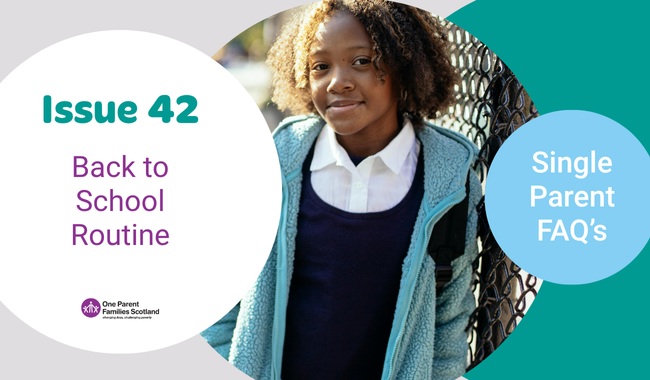Single Parent FAQs: Back to School Routine – Issue 42

11/08/2025
Our Advice and Information team who work on our Lone Parent Helpline, webchat and Ask a Question feature, receive questions from single parents from across Scotland every day.
After the long summer break, getting back into a routine can feel like a big adjustment for you and your children. Sleep schedules might be off, energy levels low and school mornings stressful. As a single parent, you might also be managing everything on your own.
In this issue, we answer your most common questions about re-establishing structure and easing into the new school year smoothly.
Take a look at the answers to the most frequently asked questions about back to school arrangements
How can I reset our daily routine after the holidays?
Start small and build consistency gradually:
- Reintroduce regular bedtimes and wake-up times a week or two before school starts
- Set a morning routine, it can be a good idea to do something as simple as getting dressed breakfast and brushing teeth at the same time each day
- Plan out the day with meals, screen time, and downtime in a predictable order
- Use visual schedules or charts for younger children to help them feel more in control
Children often respond well to routines when they feel involved, let them help choose elements like snacks or clothes for the next day.
My child is struggling to adjust, what can I do?
Returning to school can be overwhelming after a long break. You can:
- Talk openly about how your children are feeling, be reassuring and calm
- Validate their worries without trying to “fix” everything immediately
- Give them time to re-adapt, it may take several weeks
- Keep home life as predictable as possible
- Encourage early nights, healthy food, and movement
If concerns persist, speak to your child’s teacher or school support staff.
How do I get back into a school-day routine as a single parent?
Juggling mornings and evenings solo is tough, preparation is key:
- Prepare the night before by laying out uniforms, packing lunches and signing any forms you might need to
- Use alarms or visual reminders for timekeeping
- Get up 15–30 minutes before your children if possible, to give yourself a moment of calm
- Don’t aim for “perfect”, just find what works for your family and stick with it
- Ask for support if you need it , even occasional help from a friend, neighbour or family member can make a big difference
What if my child refuses to go back to school?
School refusal can happen for many reasons. If your child is reluctant:
- Stay calm and supportive, avoid punishment or conflict
- Try to understand the underlying cause, could they be coping with social worries? Anxiety? Academic struggles?
- Keep communication open with the school
- Ask about support such as a guidance teacher, school counsellor, or nurture group
- If things don’t improve, your GP or local authority education support service may be able to help
How do I manage screen time after the summer holidays?
It’s normal for children to have had more screen time over summer. To rebalance:
- Set clear screen-free times, like during meals or bedtime
- Use tools like timers or app limits if needed
- Offer alternatives such as games, walks, or creative activities
- Be consistent and explain why limits are important
- Model healthy screen use when you can as children often mimic adults
This can take time, don’t worry if there’s some resistance at first.
I feel overwhelmed trying to get everything “back to normal”, what can I do?
Many single parents feel pressure to instantly re-find their structure, but it’s okay to take your time.
- Focus on progress, not perfection
- Be kind to yourself and recognise how much you’re doing
- Try to fit in small breaks or quiet moments during the day
- Reach out to your support network or local groups
- Speak to someone if your stress feels unmanageable
Useful Links & Contacts
- Parent Club Scotland has back to school advice
- Children First has a free Parentline Helpline: 08000 28 22 33
- Young Scot has support for teens returning to school
- NHS Inform has children’s mental health & routine tips

See our previous issues of Single Parent FAQs on:
- Summer child contact arrangements
- Supporting children with school transitions
- Managing your mental health
- Having fun on a budget
- Childcare
- Separating
- Scottish Benefits
- Child Maintenance
- Having a Baby
- Back to School
- Child contact arrangements
- Scottish benefits
- Separation
- Having a baby
- Housing options
- Child maintenance
- Child contact
- Universal Credit
- Getting back into education as a single parent
- Financial support for single parents
- Bridging payments and help for Christmas
- Social Security Scotland
- What happens when my child gets older
- Separation and divorce
- Support for students
- Domestic abuse
- When does Child Benefit stop?
- Adult Disability Payments
- Child Maintenance
- What happens when my child gets older (2)
- Cost of Living
- Summer holidays
- What happens when my child gets older
- Universal Credit Managed Migration
Remember you can submit your own question via the Ask A Question feature on our website any time and our expert advisers will respond.
"*" indicates required fields